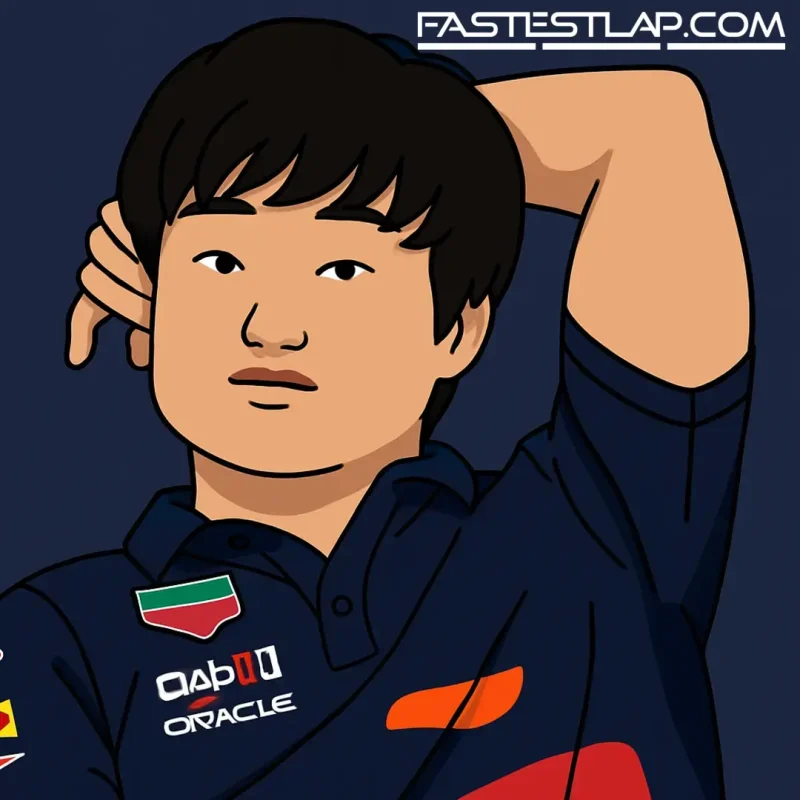Yuki Tsunoda’s radio used to erupt like a kettle. In Baku, it barely simmered.
Told to pick up the pace while locked in a DRS train and hunting Liam Lawson for fifth, the Red Bull driver didn’t bark back. No fireworks, no flurry of bleeps. Just a calm acknowledgment and a steady squeeze of the lap time. He’d go on to bank sixth in Azerbaijan — his best result of the season — and, more importantly, a glimpse of the grown-up version of a driver Red Bull once hesitated to promote.
This stuff matters to the people who make calls in Milton Keynes. It was only a few seasons ago that Helmut Marko bristled at Tsunoda’s outbursts at the junior team, dismissing the “bloody f*cking car” radio rants as noise that helped no one. The message then was blunt: stop swearing, start analyzing. Talk less, say more.
Tsunoda knows the file on him. He also knows what 2026 represents: new rules, new power units, and a chance for Red Bull to reset its driver line-up if it wants to. So when the “push, push” call came in Baku, he showed a different side.
“Four years ago I would’ve said, ‘I’m doing it!’ very loudly on the radio,” he admitted to DAZN. “But I’ve progressed in that aspect of my personality. I’ve improved my calmness and was able to close the gap little by little. I kept doing it bit by bit. I think I’ve improved in discipline compared to four years ago.”
The timing is handy. Tsunoda’s pace has been stop-start this year, but in Azerbaijan he and the team found a window that worked. “The pace was good, different to other weekends,” he said. “I already had a feeling since FP2 and the team supported me a lot. We made changes to the car that helped me improve my long runs. We were able to show that with this final result. Obviously, I’m still not where I want to be, but we’re getting there, progressing every race.”
Progress is the currency now. Red Bull’s bar is dauntingly high with Max Verstappen in the other car, and Tsunoda’s path to making his seat bulletproof isn’t a single hero drive — it’s the drumbeat of clean Saturdays, tidy first laps, and Sundays without self-inflicted bruises. One P6 won’t close the gap, but it can change the conversation, especially if it’s accompanied by the sort of composure that used to elude him.
There’s another layer here. Tsunoda’s early F1 chapters were noisy and raw, a young driver shot out of Super Formula and thrust into the glare. The speed was obvious; the rough edges even more so. Red Bull loved the spark but questioned the flame control. He’s spent the years since sanding those edges down — and days like Baku are how you show the bosses you’ve done the work.
None of this means the 2026 equation is solved. The marketplace is jittery, and Red Bull’s options are never limited. But a driver who can match decent points with calm, actionable radio and a clear technical read is one who earns runway when decisions get made. That was the quiet win in Baku: Tsunoda didn’t just drive well; he sounded like a driver Red Bull can plan with.
Next step: repeat it. Keep the Saturdays crisp. Keep the radio cool. Keep chipping away — bit by bit, as he put it — until a tricky sixth becomes a frequent fifth, and then an opportunistic fourth. The version of Yuki Tsunoda that Red Bull wants in 2026 looks a lot like the one we heard in Azerbaijan. Less kettle, more conductor.




